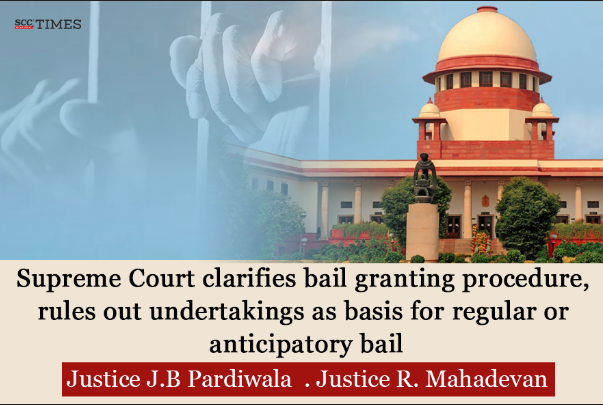Supreme Court Rules Out Bail Based on Undertakings, Emphasises Case Merits

Supreme Court: In an appeal filed against the order passed by the Bombay High Court, where an interim application was allowed and the bail order was modified, the division bench of JB Pardiwala* and R. Mahadevan, JJ. made it unequivocally clear through explicit directions that henceforth, no Trial Court or High Court shall grant regular bail or anticipatory bail based on any undertaking furnished by the accused solely for the purpose of obtaining such relief.
The Court directed that all applications for regular bail or anticipatory bail must be decided strictly on the merits of the case. It further emphasised that neither the High Courts nor the Trial Courts shall exercise their discretion in such matters based on any undertaking or statement made by the accused, indicating a willingness to deposit any amount or fulfill any condition that is unrelated to the merits of the case.
Background
The accused was arrested for offences punishable under Sections 406, 408, 420, 467, 468, 471, 504and 506 read with Section 34 of the Penal Code, 1860 (‘IPC’). He was arrested on 17-08-2023.
As the Trial Court declined to grant regular bail, the accused approached the High Court by filing a bail application. The High Court, vide order dated 01-04-2024, directed the release of the accused on regular bail, subject to the deposit of Rs. 25,00,000/- before the Trial Court. The allegations against the accused pertained to the misappropriation of an amount of Rs. 1,60,00,000/-
During the hearing of the bail application before the High Court, a statement was made on behalf of the accused, that he was ready and willing to deposit Rs. 25,00,000/-, and on such deposit, he may be released on regular bail. Pursuant to the above, an affidavit-cum-undertaking dated 22-03-2024 was filed by the accused before the High Court.
Taking advantage of the High Court’s order, the accused secured his release on bail. However, he failed to deposit the amount of Rs. 25,00,000/- as undertaken before the High Court under oath. In view of this, respondent 2 (the original complainant) filed an interim application in the original bail proceedings seeking cancellation of the bail granted to the accused.
Subsequently, the High Court, vide its impugned order dated 01-07-2025, directed the accused to surrender before the Court of the Judicial Magistrate First Class, Satara, within a period of four weeks.
Analysis and Decision
The Court noted that, over a period of time, various High Courts had been passing orders granting regular bail and anticipatory bail subject to the deposit of certain amounts.
It further observed that there had been instances, including the present case, where accused persons had filed affidavits in the form of undertakings, assuring that they would deposit a specified amount within a particular time frame. However, such accused persons later conveniently resiled from their undertakings, contending that the condition imposed was onerous.
The Court observed that in some cases, the accused may abide by the undertaking given at the time of seeking bail. However, based on its experience, it found that in many cases, the accused would later fail to honour such undertakings and wilfully flout them.
It further noted that in numerous instances, arguments were advanced on behalf of the accused asserting that no such statement or undertaking had been made by them and that the Court had, on its own, recorded in the order that the accused was ready and willing to deposit a particular amount. In certain cases, the entire blame was shifted onto the lawyer, alleging that such statements were made by counsel without instructions, solely to obtain an order granting bail or anticipatory bail.
In such circumstances, the Court concerned was left with no option but to cancel the bail, either at the instance of the State or the original complainant.
The Court highlighted that in the present case, the accused, of his own free will and volition, had filed an affidavit in the form of an undertaking before the High Court, stating that he would deposit an amount of Rs. 25,00,000/-. However, he subsequently failed to honour this undertaking, leading to the cancellation of his bail by the High Court.
The Court remarked that it was inappropriate for the accused’s counsel to argue that requiring the deposit of Rs. 25,00,000/- was unreasonable, especially after such an undertaking had been made voluntarily. Such conduct, the Court noted, reflected poorly on professional ethics.
The Court made it unequivocally clear through explicit directions, that henceforth, no Trial Court or High Court shall grant regular bail or anticipatory bail based on any undertaking furnished by the accused solely for the purpose of obtaining such relief.
The Court directed that all applications for regular bail or anticipatory bail must be decided strictly on the merits of the case. It further emphasised that neither the High Courts nor the Trial Courts shall exercise their discretion in such matters based on any undertaking or statement made by the accused indicating a willingness to deposit any amount or fulfill any condition unrelated to the merits.
The Court strongly disapproved of the prevailing practice, stating that it must be brought to an end. It observed that litigants had been taking undue advantage of such undertakings, thereby undermining the dignity and sanctity of the judicial process.
The Court observed that, in the present case, it was not inclined to examine the merits of the accused’s plea for regular bail. It noted that the accused had made a mockery of the justice system and had abused the process of law. The Court further remarked that if the High Court intended to grant bail, it ought to have first directed the accused to deposit the requisite amount within a stipulated time frame and only thereafter ordered his release upon such deposit.
The Court remarked that “We hope and trust that the High Courts as well as the Trial Courts across the country do not commit the same mistake again.”
Nonetheless, the Court clarified its position unequivocally: henceforth, no High Court or Trial Court shall pass any order granting regular bail or anticipatory bail based on an undertaking by the accused or their family members to deposit a particular amount. All such pleas shall be decided strictly on their own merits, in accordance with law.
The Court held that if a case for bail is made out on merits, the court may exercise its discretion to grant relief. However, if no such case is made out, the plea must be rejected. Under no circumstances, it emphasised, shall the High Courts or Trial Courts pass a conditional order of bail based on monetary undertakings.
Accordingly, the appeal was dismissed.
The Court directed the Registry to circulate a copy of the present order to all High Courts at the earliest.
The Court further directed that upon surrender and being taken into judicial custody, it shall be open to the accused to file a fresh application for regular bail before the appropriate court, which shall be decided strictly on its own merits and in accordance with law.
In conclusion, the Court imposed costs of Rs. 50,000/- on the accused for gross abuse of the legal process and for attempting to mislead both the High Court and the Supreme Court. The said amount was directed to be deposited within one week before the Supreme Court Mediation Centre, with compliance to be duly reported.
[Gajanan Dattatray Gore v. State of Maharashtra, Criminal Appeal No. 3219/2025, decided on 28-07-2025]
*Order by : Justice JB Pardiwala
For Petitioner(s) : Mr. AM Bojor Barua, Sr. Adv. Mr. Ravindra A. Lokhande, Adv. Mr. Vishal, adv. Mr. Kalpna Chate, Adv. Mr. Rukhmini Barua, Adv. Mr. N zealing, adv. Mr. Rathod Rajesh Ranjit, Aor
For Respondent(s) : Mr. Prashant S. Kenjale, Aor

